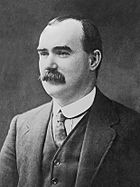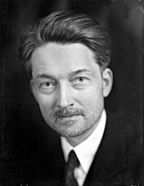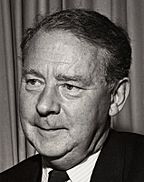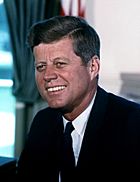Declan Costello facts for kids
Quick facts for kids
Declan Costello
|
|
|---|---|
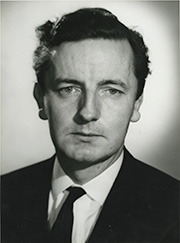 |
|
| President of the High Court | |
| In office 1 August 1995 – 12 October 1998 |
|
| Nominated by | Government of Ireland |
| Appointed by | Mary Robinson |
| Preceded by | Harry Whelehan |
| Succeeded by | Frederick Morris |
| Judge of the High Court | |
| In office 1 June 1977 – 3 September 1998 |
|
| Nominated by | Government of Ireland |
| Appointed by | Patrick Hillery |
| 16th Attorney General of Ireland | |
| In office 15 March 1973 – 19 May 1977 |
|
| Taoiseach | Liam Cosgrave |
| Preceded by | Colm Condon |
| Succeeded by | John M. Kelly |
| Teachta Dála | |
| In office February 1973 – May 1977 |
|
| Constituency | Dublin South-West |
| In office May 1951 – June 1969 |
|
| Constituency | Dublin North-West |
| Personal details | |
| Born |
David Declan Costello
1 August 1926 Ballsbridge, Dublin, Ireland |
| Died | 6 June 2011 (aged 84) Beaumont Medical Clinic, Dublin, Ireland |
| Resting place | Shanganagh Cemetery, Shankill, Dublin, Ireland |
| Political party | Fine Gael |
| Spouse |
Joan Fitzsimons
(m. 1954) |
| Children | 6, including Caroline |
| Parents |
|
| Education |
|
| Alma mater |
|
Declan Costello (born August 1, 1926 – died June 6, 2011) was an important Irish judge, lawyer, and politician from the Fine Gael party. He served as the President of the High Court from 1995 to 1998. Before that, he was a High Court Judge from 1977 to 1998 and the Attorney General of Ireland from 1973 to 1977.
Declan Costello was also a Teachta Dála (TD), which is a member of the Irish Parliament. He represented the Dublin North-West area from 1951 to 1969 and Dublin South-West from 1973 to 1977. He created a famous policy plan called Towards a Just Society. This plan helped Fine Gael become a more modern party and work better with the Labour Party. Many of his ideas were later supported by Garret FitzGerald, who became the leader of Fine Gael and served as Taoiseach (Prime Minister) twice. As Attorney General, Costello set up the Office of the Director of Public Prosecutions and the Law Reform Commission. Because of these important changes, he is often called the "most impactful Attorney General in Ireland's history."
Contents
Early Life and Education
David Declan Costello was born in Ballsbridge, Dublin, Ireland. His father, John A. Costello, was also a very important politician who served as Taoiseach two times. His mother was Ida Mary Costello. Declan went to school at Sacred Heart convent school and St Xavier's School in Dublin.
He studied Law and Economics at University College Dublin (UCD) starting in 1943. He was very good at debating and won many awards. In 1944, he received a scholarship to King's Inn, a place where lawyers are trained. In 1946, his studies were paused because he became very ill and had to spend 10 months recovering in Switzerland. This illness affected his health for the rest of his life. He finished his degree in 1948 and became a lawyer in Dublin.
Political Journey
Becoming a TD and Helping Others
Declan Costello joined the Fine Gael party while he was in college, following his family's political background. In 1951, when he was just 24 years old, he was elected as a TD for Dublin North-West. He was the youngest member of the Dáil at that time.
Living and working in Dublin North-West showed him the difficult living conditions of many people. This experience deeply changed his views, especially about housing. In 1953, Declan married Joan Fitzsimons, and they had six children together. One of their sons had special needs, which made Declan very passionate about helping children with similar challenges. He also had an elder brother who had learning difficulties.
In 1955, Costello helped start the Association of Parents and Friends of Mentally Handicapped Children, which later became known as St Michael's House. He also helped raise money for a daycare centre for children with special needs in 1956, which became an official school in 1960. From 1956 until his death in 2011, Costello was the president of St Michael's House, overseeing many centres across Dublin.
Making His Own Mark in Politics
After the 1954 election, Declan's father, John A. Costello, became Taoiseach again. Even though Declan wasn't a government minister, he had some influence on his father's government. He often pushed for more progressive ideas, disagreeing with some of the government's strict money-saving plans.
After the 1957 election, when Fine Gael lost power, Costello became the party's spokesperson for foreign affairs. He believed in liberal ideas and supported European countries working together. He also started saying that Fine Gael should become more modern and appeal to a wider range of people, especially to work with the Labour Party. He wanted to change the party's image from being just for wealthy people.
In the late 1950s, Costello became more active in Fine Gael. He started a political magazine and a group to develop new policies for the party. However, many in the party were slow to accept his new ideas. When his father retired from politics in 1959, James Dillon became the new leader, and Costello felt he had less influence.
The Just Society Plan
In 1963, Costello tried to change Fine Gael's policies, but the party leaders stopped him. So, in April 1964, he went against party rules and shared his ideas for changing Ireland's economy. He thought this would be his reason to leave politics and focus on his law career.
However, to his surprise, many younger Fine Gael members liked his ideas. They wanted the party to have new ways of thinking that were different from the main rival party, Fianna Fáil. Journalists also became interested, seeing a new direction for Irish politics.
Costello debated his ideas with the party's main leaders and convinced them. When a general election was called suddenly in 1965, Fine Gael didn't have time to create a new plan, so they adopted Costello's ideas. He expanded his plan into a 30,000-word document called Towards a Just Society. This document had a huge impact on the party for many years.
Towards a Just Society suggested big changes for Ireland's economy. It called for:
- Fair wages for women.
- Improvements to schools for young people.
- Lower indirect taxes.
- Almost free healthcare for everyone.
- An education system that allowed all students to go to university, no matter how wealthy they were.
Even though it was a very new plan, it was hard to explain to everyone during the short election campaign in 1965. Fine Gael didn't win more seats, but the Just Society plan made other parties, like Fianna Fáil, change their own policies on housing, health, and welfare.
After the 1965 Election
After the 1965 election, Costello wanted to become the leader of Fine Gael to continue his Just Society project. However, Liam Cosgrave became the new leader instead. Costello was disappointed and took on the role of spokesperson for health and social welfare.
Around this time, Costello's health became an issue again. A younger politician named Garret FitzGerald started to take over as the leader of the progressive group within Fine Gael. Costello had actually encouraged FitzGerald to join the party. Like Costello, FitzGerald was the son of an important party member but had more modern views than his father.
In 1967, Costello announced he would not run for election again and focused on his successful law career. Many people, including other politicians, were sad to see him leave politics, saying Ireland was losing a "young man of great courage and idealism."
Even outside of official politics, Costello continued to be involved. He hosted meetings where Fine Gael and Labour members discussed working together. When it seemed possible that Fine Gael and Labour could form a government after 1970, Costello decided to run for election again. He was elected in a new area, Dublin South-West, in the 1973 Irish general election. His progressive views helped strengthen the Fine Gael/Labour partnership.
Attorney General of Ireland
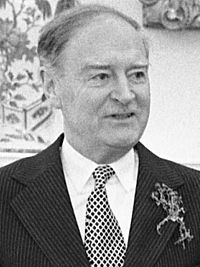
When Fine Gael returned to government in 1973, Declan Costello was appointed Attorney General by Taoiseach Liam Cosgrave. Even though this job paid less than his private law practice, Costello accepted it. As Attorney General, he rarely spoke in the Dáil, but his opinions were highly valued by other government ministers.
As Attorney General, Costello was involved in the talks for the Sunningdale Agreement, which aimed to bring peace to Northern Ireland. He worked closely with John Hume, a leader from Northern Ireland, to create strong all-Ireland organizations. When the agreement was challenged in court, Costello successfully defended it.
Costello also tried to update family laws in Ireland to be fairer to single mothers and children born outside of marriage, but these efforts were not successful at the time.
He also worked to make the Attorney General's office less political. In 1975, he successfully created the Office of the Director of Public Prosecutions. This meant that decisions about criminal cases would be made fairly, without being influenced by political connections. He also founded the Law Reform Commission in 1975 to help update Irish laws. Over time, this commission helped bring about many important legal changes.
Costello also had strong views on international matters. He believed that Ireland should not easily hand over prisoners from the Provisional Irish Republican Army to the United Kingdom. He had been part of a case against the UK at the European Commission of Human Rights in 1973, where he argued that the UK was treating prisoners unfairly. He proved in court that the British state was using illegal techniques on prisoners. In 1977, the court ruled that prisoners had been treated harmfully.
Because he created the Office of the Director of Public Prosecutions and the Law Reform Commission, Declan Costello is remembered as the "most impactful Attorney General in Ireland's history."
Judicial Career
In May 1977, Declan Costello resigned as Attorney General and as a TD to become a judge of the High Court. As a judge, he was known for being very careful and hardworking. He specialized in equity, which is a type of law that deals with fairness. He also helped create new ways to freeze assets and issue search warrants to deal with growing crime.
Costello was known for making quick decisions about cases and encouraging lawyers to present strong arguments. He often used clever legal details to make his decisions, which were very hard to appeal. Some of his decisions on intellectual property (like patents and copyrights) were even used as examples in other countries.
After a terrible oil tanker explosion at Whiddy Island in 1979, where 50 people died, Costello was chosen to lead an investigation. His report was very critical of the companies involved and also of the Irish authorities for not properly checking safety. He was praised for how quickly and thoroughly he handled this important investigation.
In 1985, Costello made a decision in a case involving Eileen Flynn, an unmarried teacher who had a child while working at a Catholic school. He supported the nuns who ran the school, agreeing that Flynn's actions could harm their efforts to uphold Catholic values.
Costello's decisions as a judge were guided by his belief that the Irish constitution should be understood in light of its Christian values and ideas about natural law, which emphasizes morality and fairness. He believed that Irish judges could overturn laws that went against these principles, but he also advised them to use this power very carefully.
In 1989, Costello made important rulings about the limits of judicial power. In one case, he ruled that courts could not decide how the government should spend public money, as this required special knowledge. In 1995, he ruled that a "withholding tax" was against the constitution, a decision that cost the state a lot of money.
The X Case
In 1992, Declan Costello made a ruling in a very important case known as the X Case. This case involved a young girl who had been harmed and became pregnant. The family wanted to travel to another country for medical help, but the High Court, led by Costello, initially ruled that she could not leave Ireland.
This decision caused a huge reaction and was criticized internationally. However, the Supreme Court later overturned Costello's ruling. This led to a constitutional amendment in November 1992, which allowed people to travel to other countries for services that were legal there.
President of the High Court
Even after the X Case, Declan Costello was appointed President of the High Court in 1995. He had already been acting president since 1991. As president, he created new ways to handle urgent cases more quickly. He retired as a judge in December 1997.
His final public role was leading an investigation into a tax evasion scheme involving the Guinness and Mahon Bank. He took on this role in 1999 but retired in 2000 due to health reasons.
People Who Influenced Him
Declan Costello was greatly influenced by the Catholic philosopher Jacques Maritain, who believed that human rights should serve the good of everyone, not just individuals. Costello also admired other leaders, including:
- Hugh Gaitskell, a leader of the British Labour Party.
- James Connolly, an Irish socialist.
- Kevin O'Higgins, an Irish Minister for Justice.
- John F. Kennedy, a US President.
Some researchers also believe that Pope John XXIII's ideas from 1961, especially about social justice, clearly influenced Costello's Just Society document.
Family Life
In 1950, Jacqueline Bouvier, who later became famous as Jackie Kennedy, visited Ireland. She met the Costello family through a priest. Jacqueline was looking for a husband at the time, and the priest suggested Declan. She wrote that Declan "sounds like absolute heaven" and would make a "suitable" husband. However, they never became a couple, as Jacqueline continued her travels and later returned to the United States.
Declan Costello married Joan Fitzsimons in 1953. Jacqueline later returned to Ireland in 1955 as Mrs. Jacqueline Kennedy with her new husband, US Senator (and future President) John F. Kennedy. She introduced him to the Costello family. Jacqueline later wrote a private letter to Costello, remembering a fun dinner they had together: "That night we dined at Jammet's and our happy marriage was nearly torn apart because Jack was enchanted by Joan and I was enchanted with you — but somehow we patched it all up at the movies."
Declan and Joan Costello had six children. One of their daughters, Caroline Costello, followed in her father's footsteps and also became a judge.
Declan Costello passed away on June 6, 2011, in Dublin, after a long illness.
Legacy
The ideas from Declan Costello's Just Society plan continued to be important for many decades after it was published. It is often called a "milestone" in the history of the Fine Gael party. In the 1980s, Garret FitzGerald, as Taoiseach, was seen as someone who championed the Just Society ideas.
Even recently, during the 2017 Fine Gael leadership election, one of the candidates, Simon Coveney, said he wanted to bring the party back to the principles of the Just Society. Another important Fine Gael member, Paschal Donohoe, wrote an article praising the document and calling for it to be a central part of Fine Gael's policies again.
See also
- Families in the Oireachtas
|
 | Stephanie Wilson |
 | Charles Bolden |
 | Ronald McNair |
 | Frederick D. Gregory |


